Human Rights Watch Israel-Palestine Team Quits Over Blocked Report on Right of Return
“I have lost my faith in the integrity of how we do our work and our commitment to principled reporting on the facts and application of the law,” said resigning staffer Omar Shakir.
Two Human Rights Watch employees—the group's entire Israel-Palestine team—resigned after senior staffers blocked a report calling Israel's denial of Palestinian refugees' right of return to their homeland a crime against humanity.
Jewish Currents' Alex Kane reported Tuesday that HRW Israel-Palestine team lead Omar Shakir and assistant researcher Milena Ansari are stepping down over leadership's decision to nix the report, which was scheduled for release on December 4. Shakir wrote in his resignation email that one senior HRW leader informed him that calling Israel's denial of Palestinian right of return would be seen as a call to “demographically extinguish the Jewishness of the Israeli state.”
“I have lost my faith in the integrity of how we do our work and our commitment to principled reporting on the facts and application of the law,” Shakir—who is also member of Jewish Currents' advisory board—wrote in his resignation letter. “As such, I am no longer able to represent or work for Human Rights Watch.”
In an interview published Tuesday by Drop Site News, Shakir—who was deported from Israel in 2019 over his advocacy of Palestinian rights—said: “I’ve given every bit of myself to the work for a decade. I’ve defended the work in very, very difficult circumstances... The refugees I interviewed deserve to know why their stories aren’t being told."
Ansari said that "whatever justification" HRW leadership "had for pausing the report is not based on the law or facts."
The resignations underscored tensions among HRW staffers over how to navigate a potential political minefield while conducting legal analysis and reporting of Israeli policies and practices in the illegally occupied Palestinian territories.
As Kane reported:
The resignations have roiled one of the most prominent human rights groups in the world just as HRW’s new executive director, Philippe Bolopion, begins his tenure. In a statement, HRW said that the report “raised complex and consequential issues. In our review process, we concluded that aspects of the research and the factual basis for our legal conclusions needed to be strengthened to meet Human Rights Watch’s high standards.” They said that “the publication of the report was paused pending further analysis and research,” and that the process was “ongoing.”
Kenneth Roth, a longtime former HRW executive director, defended the group's decision to block the report, asserting on social media that Bolopion "was right to suspend a report using a novel and unsupported legal theory to contend that denying the right to return to a locale is a crime against humanity."
However, Shakir countered that HRW "found in 2023 denial of a return to amount to a crime against humanity in Chagos."
"This is based on [International Criminal Court] precedent," he added. "Other reports echoed the analysis. Are you calling on HRW to retract a report for its first time ever, or it just different rules for Palestine?"
Polis Project founder Suchitra Vijayan said on X Tuesday that "the decision by Human Rights Watch’s leadership to pull a report on the right of return for Palestinian refugees, after it had cleared internal review, legal sign-off, and publication preparation, demands public reckoning."
"This was not a draft in dispute and the explanation offered so far evades the central issue of 'institutional independence' in the face of political pressure," added Vijayan, who is also a professor at Columbia and New York universities. "Why was the report stopped, and what does this decision signals for the future of its work and credibility on Palestine?"
Offering "solidarity to Omar and Milena" on social media, Medical Aid for Palestinians director of advocacy and campaigns Rohan Talbot said that "Palestinian rights are yet again exceptionalized, their suffering trivialized, and their pursuit of justice forestalled by people who care more about reputation and expediency than law and justice."
Sarah Leah Whitson, HRW's former Middle East and North Africa director and currently executive director at Democracy for the Arab World Now, told Drop Site News on Tuesday that “We have once again run into Human Rights Watch’s systemic ‘Israel Exception,’ with work critical of Israel subjected to exceptional review and arbitrary processes that no other country work faces."
The modern state of Israel was established in 1948 largely through a more than decadelong campaign of terrorism against both the British occupiers of Palestine and Palestinian Arabs and the ethnic cleansing of the latter. More than 750,000 Palestinians fled or were expelled from their homeland, sometimes via massacres or the threat thereof, in what Arabs call the Nakba, or catastrophe.
More than 400 Palestinian villages were destroyed or abandoned, and their denizens—some of whom still hold the keys to their stolen homes—have yet to return. Today, they and their descendants number more than 7 million, all of whom have been denied the right of return affirmed in United Nations General Assembly Resolution 194.
Many Palestinians and experts around the world argue that the Nakba never ended—a position that has gained attention over the past 28 months, as Israel has faced mounting allegations of genocide for a war that's left more than 250,000 Palestinians dead, maimed, or missing in the coastal strip and around 2 million people forcibly displaced, starved, or sickened.
Bolopion told Kane Tuesday that the controversy over the blocked report is “a genuine and good-faith disagreement among colleagues on complex legal and advocacy questions."
“HRW remains committed to the right of return for all Palestinians, as has been our policy for many years," he added.


